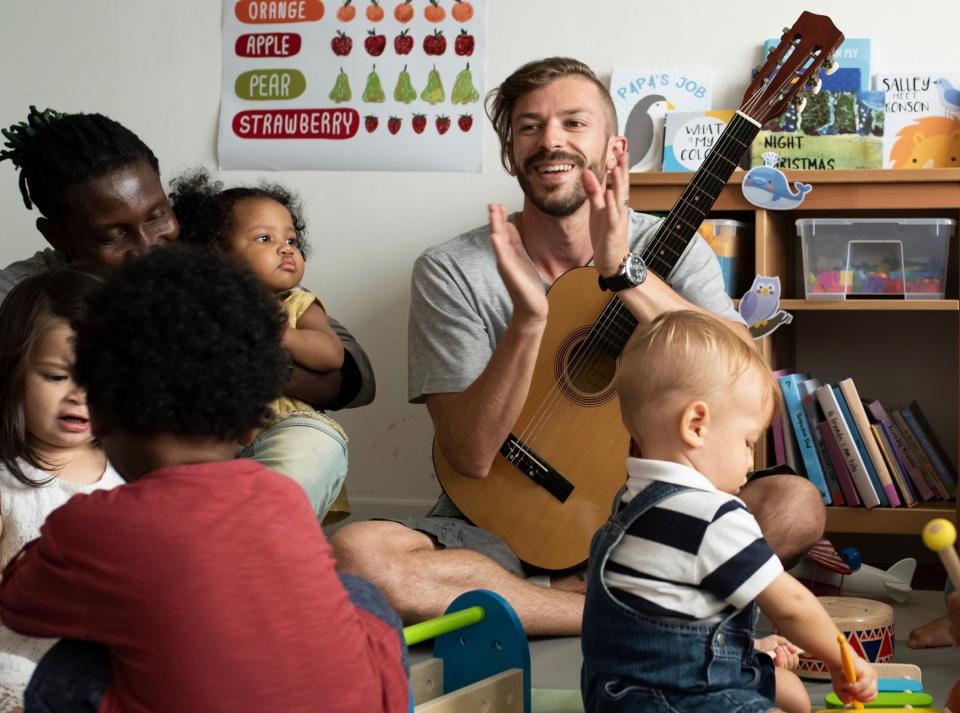10 Questions to Help You and Your Co-Parent Agree on Childcare
When you have joint legal custody, daycare decisions can get complicated quickly. Who chooses the childcare arrangements after divorce or separation? Who pays? What happens when your care provider isn’t available?

The quick answer to all these questions is “check your parenting plan.” If you have joint legal custody, aka shared decision-making responsibilities, then you may both have the right to make childcare decisions—which can create a complicated situation. You should consider these 10 things when you’re making childcare decisions after divorce or separation:
- Who gets to choose childcare?
- Who pays for childcare?
- What type of childcare is best?
- How do you choose childcare?
- How do you agree on childcare?
- What if you want to have separate childcare?
- Who is responsible for transportation?
- What if the daycare closes or your kid gets sick?
- How do you communicate about childcare?
- Should you use a co-parenting app to help manage childcare?
These decisions can be difficult and uncomfortable. Lack of communication, frequent disagreements, or bitterness stemming from past issues might get in the way of making smart decisions about childcare. But if you’re thoughtful about how you approach the issue, past problems don’t have to be disruptive.
1. Who gets to choose the childcare arrangements in divorce or separation?
Your parenting plan should outline which parent has the right to choose childcare, but it usually depends on who has legal custody—which we’ll also be referring to as “decision-making responsibilities.”
At OurFamilyWizard, we don’t love the term “custody”—it feels a little too transactional and less relationship-based. Many family law professionals prefer this newer terminology, and even some courts have made new terms official.
When one parent has sole decision-making responsibilities, they generally get to select the daycare, nanny, and/or babysitter.
When the parents share decision-making responsibilities (or have joint legal custody), daycare decisions are a topic of discussion, and both of you have to agree on a decision.
In some situations, different decision topics can go to different parents. You might get to make decisions about:
- Education
- Health
And your co-parent might get to make decisions about:
- Religion
- Extracurricular activities
If your areas of responsibility are split, your parenting agreement should spell out who gets to make childcare or daycare decisions, too.
2. Who pays for childcare after a divorce or separation?
For many divorced parents, childcare expenses are shared. It depends on the parenting plan, which may spell out how childcare costs will be covered. If you have shared parenting time (joint physical custody), it often makes sense to split daycare costs evenly. But—as with all things co-parenting—the split depends on the individual situation.
If you have a 60-40, 70-30, or other nonidentical division of parenting time, then childcare costs might be included in child support (which usually means the parent with less parenting time might pay more in child support).
In California, childcare may be included in the child support order if it will allow the receiving parent to:
- Work
- Complete training that prepares them for a job
- Complete education that prepares them for a job
In some states, such as Oregon, childcare can also allow the parent to:
- Hunt for a job
But child support calculations are complex, and they’re based on many factors, including the parents’ individual incomes.
If the parent with a smaller share of parenting time earns significantly less than their co-parent, they might not need to pay additional child support for childcare. Even if you have 50-50 shared parenting time, childcare costs might not be split evenly. It all depends on your specific scenario (and parenting plan).
3. What type of childcare is best after divorce or separation?
There are four main types of childcare arrangements after divorce, and each one works a bit differently when you’re co-parenting.
Daycare
The most common option for full-time childcare, a daycare is a licensed childcare business.
- Childcare is on site (not at either parent’s home).
- Childcare is generally during working hours.
- It’s usually the cheapest option for full-time care (though it’s still not cheap!).
- Kids can socialize with other kids, which is healthy for social and emotional development.
One daycare benefit for divorced or separated parents is the easy drop-offs and pick-ups. If it’s a changeover day, you can drop your children off, and your co-parent can pick them up. You don’t have to see each other at all.
A nanny
A nanny is a part- or full-time professional childcare provider.
- Childcare takes place in your own home.
- Nannies often work during business hours, but you can usually hire someone to fit your schedule.
- Nannies are usually much more expensive than daycare.
- Kids are less likely to get sick when they have a nanny because they’re not exposed to other kids’ germs as often.
Another benefit of having a nanny is that you don’t have to rush to get your kids ready and out the door each morning. But that same reason means parenting time exchanges have to happen at your home, or at another prearranged location.
A family member
Sometimes Grandma, Grandpa, or another family member is willing to provide part- or full-time childcare. This option can look different in a lot of different scenarios.
- Childcare could take place at your house or at your family member’s house.
- This arrangement might be free, low cost, or full cost.
- The children are with someone who loves them.
A babysitter
A babysitter is a more casual childcare provider who may or may not have a career as a childcare professional, but still is experienced in keeping children happy and safe.
- A babysitter watches the children occasionally (e.g., they might fill in for you in the evening or on the weekend).
- They watch the children in your home.
- They usually charge less than a nanny.
When you have shared parenting time (joint custody), a babysitter might work for both you and your co-parent, which helps give the children a sense of consistency. Even a noncustodial parent’s babysitter might be willing to work for both parents.
Right of first refusal
Some parenting plans include a right of first refusal, which means that if you need extra childcare, then you have to offer the opportunity to your co-parent before scheduling a babysitter (or other caregiver).
The scenario goes something like this:
- You have to work on your day off, but you're scheduled to be with the kids that day.
- You inform your co-parent to find out if they can watch the kids for the day.
- If they refuse, then you can turn to your other childcare options.

4. How do you choose a childcare provider?
The most important thing is your child’s safety and wellbeing. It’s your responsibility—and your co-parent’s—to find the right person to care for your child. If you agree on that, then choosing a daycare or other caregiver is off to a good start.
When you’re talking to a potential caregiver, follow these steps:
- Ask about their previous experience with children (you can use these questions for daycares or these questions for nannies).
- Ask for references, and actually call them up and ask thorough questions.
- Ask for verification if a candidate is certified in baby or child CPR or other emergency procedures.
- With your co-parent, shortlist a few candidates and make a pros and cons list for each of them.
If you’re hiring a nanny or babysitter, then once you’ve selected a candidate,
- Do a nanny trial day.
- Run a nanny background check.
- Write and sign a contract (pay hourly—in the US, it’s illegal to pay a nanny a salary).
If you’re interviewing a nanny or babysitter, ask if they’re willing to watch your child at both of your homes. If you’re evaluating a daycare, visit the location before you send your child there.
Those are the practical details. But they’re all complicated by the co-parenting angle. That’s how you choose. But how do you agree on a choice?
5. How do you agree on a childcare or daycare decision?
Care.com suggests writing a job ad together with your co-parent, or writing a list of what you’re looking for in a daycare, to make sure you agree on what’s needed. This would be a good time to practice the three C’s of co-parenting:
- Communication
- Cooperation
- Compromise
If your co-parent really wants an in-home daycare, and you really want a bilingual nanny, maybe you can find a bilingual daycare.
If you have a written plan, then when you’re visiting daycares or interviewing babysitters or nannies, you’re more likely to agree when one fits the bill.
If you truly can’t agree on a daycare, babysitter, or nanny, then consider asking a neutral third party—like a therapist or mediator—to help you make the decision.
Above all, put your child’s needs first. The most important thing about any childcare decision is considering what’s best for the child.
6. What if you want to have separate childcare situations after divorce or separation?
Let’s say you want a nanny for the convenience, but your co-parent wants a daycare for the socialization benefits. Or maybe you both want a nanny, but you live so far apart that you can’t find someone willing to travel to both homes.
Paying for separate childcare situations is usually the most expensive option.
- Part-time nannies tend to charge more per hour than full-timers
- Sending your child to daycare three days a week often costs more than 3/5 of the price of a full week
Plus, having just one form of childcare is often good for the kids, because it provides a stable presence while their family is changing.
However, if you can swing it financially, and that’s what works best for both of you, then it’s a possibility. If you and your co-parent have a high-conflict relationship, it might be the best solution for your family, because you can minimize interaction and communication.

7. Who is responsible for taking the kids to daycare and picking them up?
As with many other things, it depends on your parenting plan! Every plan is different, and an ideal plan spells out the details, including transportation to and from daycare.
If you share parenting time with your co-parent, then drop-off and pick-up duties will generally fall with the parent who currently has parenting time. If you get the kids all day Monday, then you’re likely doing both drop-off and pickup on Monday.
If you can use drop-offs and pick-ups as changeovers, all the better.
- Your co-parent drops the kids off Monday morning.
- You pick them up Monday afternoon.
- You don’t have to see each other at all.
This is especially useful in co-parenting scenarios that have a lot of conflict.
When you drop off your child on a changeover day, tell them who will pick them up. (“Today is Daddy’s day to pick you up! He’ll see you later!”) Knowing what to expect helps kids process complicated situations.
If you have a nanny, there might not be any pick-ups or drop-offs. Or if you need to take the kids to your co-parent at the end of the day, the nanny might be willing to do it (on the clock and reimbursed for gas).
8. Who provides childcare if the daycare closes, or if the child (or nanny) gets sick?
It’s critical for you and your co-parent to make a plan for backup childcare. If the daycare closes or someone gets sick and you aren’t available, the first step might be informing your co-parent to see if they can step in. For times when neither of you is easily available, see if you can arrange an on-call babysitter or family member who is might be available on short notice.
Otherwise, if it’s your day for parenting time, then you are likely the bottom line for childcare. But check your parenting plan.
If your child gets mildly sick, and it’s not easy for you to take time off work, you’ll want a backup caregiver who is willing to provide care for a sick child. (You will probably need to pay well for this.) If your child is more seriously ill, you might need to take time off work.
Check your parenting plan to see if it covers last-minute childcare expenses.
9. How do you communicate with your co-parent about daycare or other childcare?
Making a childcare or daycare decision involves many factors, so it’s important to be proactive about discussing the issue thoughtfully.
1. Communicate clearly.
Writing out a list of what you’re looking for can help you compare notes, find commonalities, and prioritize your search criteria.
Dr. Mae Casanova, a licensed clinical psychologist, says to use solution-focused language rather than blaming. Blaming (“You never listen to my opinions about the kids!”) will take you down a spiral that completely distracts from making smart childcare decisions.
To communicate clearly, avoid mentioning what’s happened in the past. Instead, focus on what you think should be done moving forward.
2. Communicate calmly.
Dr. Casanova adds that it’s important to be aware of your own instinctive responses, like:
- Getting defensive
- Always wanting to be right
- Interrupting
And it’s just as important to know the trigger points that prompt those responses. If you recognize them before they get out of hand, it’s easier to stay in control.
3. Communicate in writing.
If everything is in writing, then you have a clear track record to back up any decisions. Even if you have a discussion in person, you should send your co-parent a message summarizing your conversation, so that you have it on the record.
Consider using a co-parenting communication app, like OurFamilyWizard, which automatically documents all messages. If there’s ever a childcare dispute, you can quickly generate a messages report to bring to mediation, therapy, or family court.
After you have a childcare decision settled, add all these details to your parenting plan:
- Who makes childcare decisions
- Whether you’re choosing a daycare, nanny, or babysitter
- Which daycare you selected or who you hired to be your nanny or babysitter
- How childcare costs are split and how they’re paid (e.g. through a co-parenting app)
- Who is responsible for transportation
- Who is responsible for childcare if your main childcare is unavailable (due to closure or sickness)
- How you’re going to communicate about childcare
Changing your parenting plan might involve going through the courts, so consult your lawyer to see what steps you need to take. But it’s crucial to have this decision recorded, since childcare will be a huge part of your child’s life.
10. Should you use a co-parenting app to help manage childcare communication and expenses?
A co-parenting app can simplify and streamline, both while you’re making the decision and after the decision has been made. OurFamilyWizard offers 5 main tools:
- Messaging
- Expenses
- A Calendar
- A Journal
- An Info Bank
Each tool helps you manage childcare when you’re co-parenting.
You can also create a third-party account for your nanny, babysitter, or daycare provider. Third-party accounts can only access limited features—for example, they can’t see messages between you and your co-parent. But those limited features can be awfully useful.
Messaging
When you communicate about childcare—whether it’s “I found a daycare!” or “Nanny’s running late today”—it will automatically be recorded. With OurFamilyWizard, messages are permanent—no editing and no deleting. You can always refer to what your co-parent originally said.
Or, with a third-party account, your nanny could send the running-late message themself.
Expenses
You can easily manage child support and other childcare expenses through the app. When you create an expense, you can upload:
- A payment receipt for daycare
- A Venmo confirmation for a babysitter
- A pay stub for a nanny
This works for regular weekly or monthly payments, but you can also use the app to request reimbursement for extra costs, like sick-child backup care or logging more nanny hours because you had to work late.
(Your childcare provider can’t see the Expenses tool.)
Calendar
The color-coded Calendar helps you keep track of parenting time, right down to drop-offs and pick-ups. If Tuesday is your day to pick up your kids from daycare, it will be clear on the Calendar.
If Grandma is watching the kids on Tuesday, you can put that in the Calendar too, and Grandma can view it from her third-party account so she stays in the loop.
Journal
Your childcare provider can log Moments (Journal entries), including both pictures and texts, so they can share:
- Special memories
- Milestones
- Activities
- Adorable photos
This way, both you and your co-parent can feel connected to your children while they’re in someone else’s care.
You can also record GPS Check-Ins to confirm that you dropped the kids off at daycare on time.
Info Bank
You can store all sorts of information and files in the Info Bank, from entering your daycare’s address to uploading your newest parenting plan.

Co-parenting childcare decisions can be easier
With these guidelines and the OurFamilyWizard app, you can simplify your decisions with your co-parent in the short term and connect with your childcare providers in the long term.
Even if you just want a written record and a way to reimburse your co-parent for childcare expenses, OurFamilyWizard offers what you need. But it’s an all-in-one co-parenting solution designed for your life. It makes co-parenting easier and helps cut down on conflict, so that you can focus on enjoying your kids.



